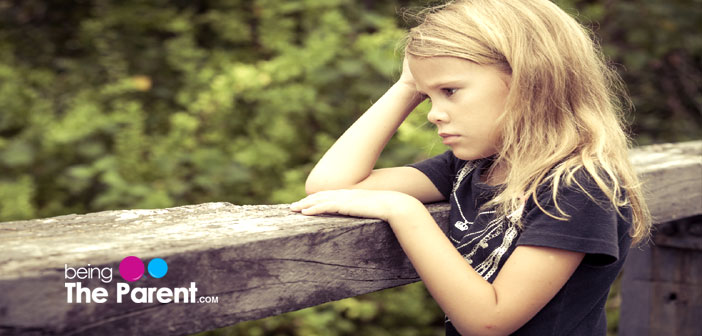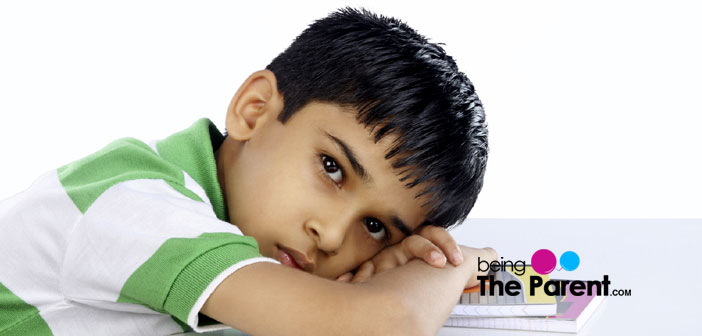
Talking About Death In The Family To A Pre-Schooler
4 min readWritten by Editorial Team

Whichever culture you belong to, death is a touchy and tricky subject to introduce to your child. Many believe that the topic is a taboo and talking about it will bring ill-luck to the family; hence, they avoid it completely. This might not, however, be a wise decision as you cannot keep your child unaware of death for long. So the sooner you answer your child’s curious questions, the more secure he will feel.

What Should You Expect When You Talk About Death With Your Child?
Believe it or not, your child is already aware of death and dying – from the stories we tell, from the TV shows they watch, from the nature where they spot dead insects and animals. Sometimes, they might have already seen a family member or pet die. Even if you think that they are too small to comprehend death (and they are!), they have been exposed to it from early on.
That said, there are tons they do not know about death. And unfortunately for us, these are tough questions for us to answer as well. For instance, they do not know:
- What causes death?
- Where do dead people/animals go?
- Why does everyone have to die?
- Why is death irreversible?
However difficult the task may seem, you need to prepare your child for this most inevitable aspect of life, especially so if you are grieving after a recent loss in family or if there is someone terminally ill or very old, very close to you.
How To Explain Death To Your Child?
-
- Be honest: It is absolutely important to be honest about death. Do not evade or mellow down the matter by saying “it is like sleeping”. Children at this age take things very literally. If death is like sleeping, will the person get up after sometime? If the person does not get up, then will death happen to anyone who falls asleep? This is how the child will think if you try to beat around the bush. Hence, it is best to be honest
- Explain in simple terms: No need to get scientific, no need to be philosophical – you child is a pre-schooler, remember? Do not give long and complicated lectures. Explain briefly, and simply. You could say that once a person dies, we would not be able to see him/her any more. They will not be able to use the body like we do – they cannot walk, jump, run, eat etc. The idea is to make them understand death is permanent
- Moan: If you have lost a loved one close to you, then it is definitely okay to grieve in front of your child. Of course, too much wailing might scare the child. But the child needs to know that is acceptable to feel bad, cry and moan a loved one’s departure from this world

- Do not evade questions: Whether you have already explained death to the child or not, they are bound to have questions. Do not avoid them, even if it difficult for you to answer. Here are some examples on how to:
- “Why did ABC Die?” Again be honest. If old age was the reason, say something like “ABC was very old. Her body could not function any more. Hence she died.” If a particular sickness was the cause of death, say “ABC was very very sick. Doctors could not cure her. Her body got so tired of being sick. That is why she died.” Be sure to assure your child that the cold or mild fever she gets will not, however, result in death.
- “Where did ABC Go?” The concepts of afterlife and heaven you want your child to know would depend on your religion or your belief system. While it is easy to say “ABC is in heaven now”, think well before you introduce this concept to your child. They might think: if heaven is such a happy place, should I go there? Why did ABC go alone? Is it possible to go there in a bus? And so on. Point is it is too abstract for a child to comprehend. More often than not they will picture it as a place or city. One idea is to admit that you or anyone for that matter do not know. Say that some people say one goes to heaven after death, some people say they come back to earth as another person – since we will never see ABC again, we won’t be able to ask. Where do you think ABC went?”
- “Will I Die? Will You Die?” Most people will live a long and happy life. But eventually, everyone will die. I am sure you will grow up, become a great mamma/daddy, then become a great grandpa/grandma. So do not worry about when you would die. And do not worry about my death too – I plan to live to see you become old. (With this, neither are you making an empty promise, nor are you going to make your child insecure about the uncertain nature of death).
Going To A Funeral: Yes Or No?
First of all, this is really subjective. If the person departed is someone very close to you or the child, you might want the child to see and do last rites for. Sometimes, you might have no place to leave the child so the only option you have is to take him with you to the funeral. If this is the case, then make sure you explain to the child that funeral is a way of saying good bye for the last time to the deceased. Also ensure that you prepare him, as much as you can, to stay quiet and in one place during the funeral. And for this very reason, we advise you to not take the child to a funeral, if you have an option. Whether the child takes it well or not, the restlessness, loud chatter and uncomfortable questions a child is bound to ask might trouble the mourning family.

Editorial Team,
With a rich experience in pregnancy and parenting, our team of experts create insightful, well-curated, and easy-to-read content for our to-be-parents and parents at all stages of parenting.Read more.
Responses (0)
Want curated content sharply tailored for your exact stage of parenting?
Related articles

The Princess and The Dragon Story With Moral in English

9 Reasons Why You Should Have Health Insurance Early

Threptin Biscuits For Babies – Are They Safe?

Structural Family Therapy Techniques, Working, and Benefits

Top 9 Best Clothing Websites For Kids – 2023

The Lion and The Mouse Story With Moral For Kids
Sponsored content
Discover great local businesses around you for your kids.
Get regular updates, great recommendations and other right stuff at the right time.





